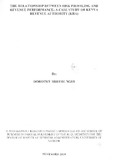| dc.description.abstract | The vision of probably all revenue authorities is to promote compliance with the provisions of the taxation laws and to ensure responsible enforcement by the revenue authorities, thereby contributing to the economic well being of the country. As with virtually all revenue authorities, KRA has to a large extent implemented the selfassessment approach to tax assessments. Because this system depends on this process of self assessment, an effective risk-based audit approach is required to ensure that tax compliance and responsible enforcement is adhered to. An effective case selection methodology is required for revenue authorities to make informed choices on how best to direct their activities in order to address areas of greatest risk.
Given these imperatives, the purpose of this study was to investigate the relationship between the risk profiling and revenue performance in KRA, and to focus on the key parameters used to allocate risk to the taxpayers. Data was collected from KRA revenue reports, additional data was extracted from the working files of 20 taxpayers that were purposefully sampled for this study to cover the all the sectors/ category of taxpayers KRA administers.
Pearson correlation coefficient was computed, which showed a strong positive relationship between risk level and the amount of additional tax collected, (r = .607, p<.Ol). Regression analysis was also used to determine the explanatory power of risk level/score in the variance of the amount of additional tax collected. The results of the study generally determined that realistic risk profiling leads to increased revenue performance as implied by the risk and return theories. | en_US |

